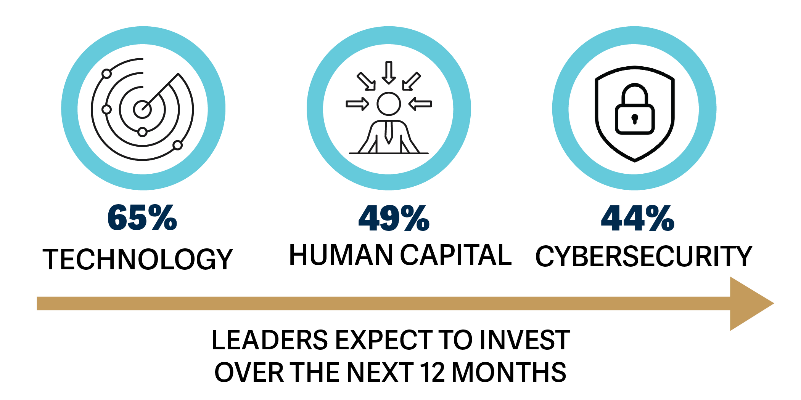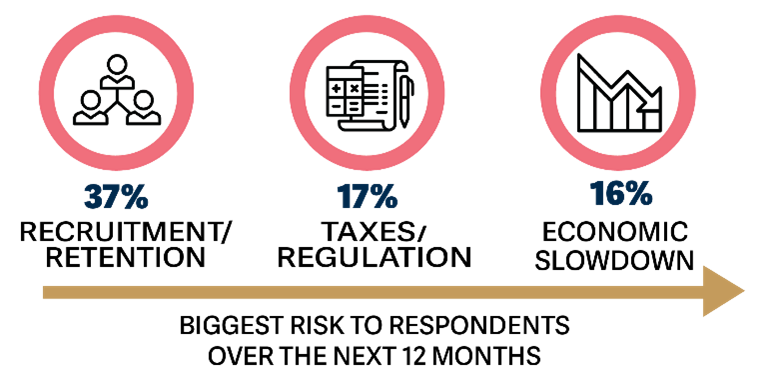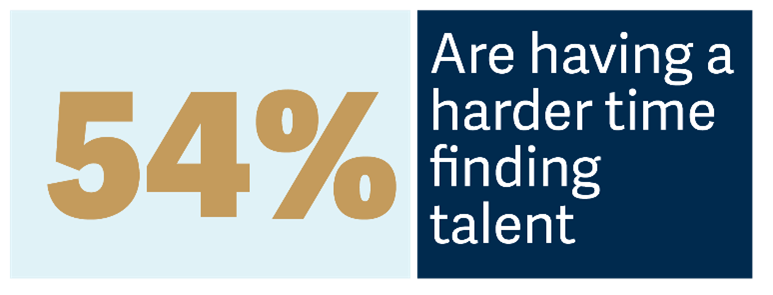
Survey: Executives Doubling Down on Technology Investment for 2022
- Published
- Dec 3, 2021
- Share
Acquiring Talent Another Major Focus
In perhaps a positive outlook for the economy, business leaders are upping the ante on technology investment. However, they have significant concerns regarding staffing. Those are a pair of key findings from EisnerAmper’s executive survey, which gauged the outlook of business leaders throughout the United States.
Much of the high-level insight from this year’s EisnerAmper’s National Business Summit (Transformation Nation – Driving Intelligent Growth) survey focused on company footprint, people and technology. Here are the survey’s key findings:
Company Footprint
- Over the next 12 months, leaders expect to make investments in technology (65%) [63% in 2020 survey], human capital (49%) [43% in 2020 survey], and cybersecurity (44%) [30% in 2020 survey]. To a lesser degree, they will invest in training (30%), process efficiencies (26%), real estate (15%), and M&A (9%).

- A majority (53%) do not intend to downsize office space over the next year [48% in 2020 survey]. A total of 10% plan to increase office size [3% in 2020 survey]. One quarter, 25% are undecided [29% in 2020 survey]. Only 12% will downsize partially or completely [20% in 2020 survey].
- Of those that recently downsized office space, 11% re-invested those savings into technology. A modest 7% was scattered among: employee benefits (2%), distributed to the partners (2%), lowered prices (1%), employee bonuses (1%), donated to charity (1%).
- The biggest risks to respondents over the next 12 months are staff recruitment/retention (37%), taxes/regulation (17%), and economic slowdown (16%). The three least risk factors are cybersecurity (12%), supply chain (8%), and diversity/gender pay gap (1%). Other was 9%.

People
- When asked if companies are having a harder time finding talent now versus 12 months ago, 54% said yes, 26% said no, and did not apply was 20%.

- Respondents shared additional perks used to retain talent, including a hybrid or full-time virtual work model (57%), salary increase (31%), more vacation time (27%), additional bonuses (22%), did nothing (21%), and other (9%).
- Respondents have taken steps to improve diversity and inclusion over the past year: 79% said yes, 21% indicated no.
Cybersecurity
- Recent steps taken to increase cybersecurity include upgraded/invested in new technology (71%), used an outside consultant or third-party provider (47%), and hired a C-suiter (17%).
- For those companies that have gone to a hybrid or full-time virtual work model, they have increased their cybersecurity investment: moderately (35%), significantly (21%), not at all (15%), and does not apply (29%).
Methodology
The survey was taken by 140 business owners, C-suiters, family office executives, and high-net-worth individuals who attended EisnerAmper’s National Business Summit held virtually on November 17.
The bulk of attendees (52%) are in financial services, real estate, manufacturing and distribution, and technology, with representation from other sectors such as health care, professional services and nonprofit. Most companies are in the annual revenue range of $50 million to $500 million.
Have questions or comments? We'd like to hear from you.



